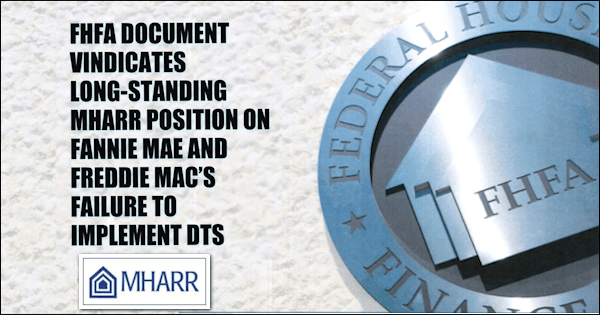
Washington, D.C., October 28, 2019 – A “Request for Input on Fannie Mae and Freddie Mac Proposed Modifications to their 2018-2020 Duty to Serve Plans” (RFI) see, relevant excerpts of this document, attached, published by the Federal Housing Finance Agency (FHFA) on October 24, 2019, fully vindicates the Manufactured Housing Association for Regulatory Reform’s (MHARR) longstanding position that the Government Sponsored Enterprises (GSEs) continue to harm both the industry and American consumers of affordable housing by refusing to fully and timely implement the Duty to Serve Underserved Markets (DTS) mandate of the Housing and Economic Recovery Act of 2008 (HERA).
While nearly 80 percent of the mainstream affordable manufactured housing market financed through personal property (i.e., chattel) consumer loans remains unserved by the GSEs more than a decade after Congress’ adoption of DTS, Fannie, Freddie and their erstwhile FHFA regulators – as consistently pointed out by MHARR — have made much of their alleged support for the comparatively tiny portion of the total manufactured housing market represented by real estate loans. Now, though, even that flimsy “commitment” to manufactured home loan purchases would be undermined and delayed by the proposed modifications to Fannie Mae’s 2018-2020 DTS Plan.
Under the proposed modifications, Fannie Mae’s 2020 “loan purchase target” for mainstream manufactured homes titled as real estate would drop from an already miniscule 450 loans to a mere “100” loans (i.e., 0.1% of the entire manufactured housing market, based on 2018 production). Further, under its separate alleged DTS undertaking to “develop an enhanced manufactured housing loan product for quality manufactured homes and purchase loans” (emphasis added) (i.e., its highly-touted “MH Advantage” program for higher-cost manufactured homes), Fannie Mae is totally removing any commitment to purchase such loans in 2019 and 2020, and is reducing its loan purchase“goal” from 500-750 such loans to a mere 25, (see, Fannie Mae proposed DTS modifications, p. 3 of 5), brazenly asserting that 25 loans “is a meaningful loan purchase target” in that it “represents a significant increase in purchase volumes as compared to 2018 and 2019.” Thus, as has been the case throughout the DTS process, Fannie effectively claims that its total failure to serve any component of the manufactured housing market in the past constitutes justification for its continuing and ongoing failure to do so.
By failing to implement anyaspect of DTS for mainstream manufactured homes in a market-significant manner – or at all– for major sections of the HUD Code market, the GSEs and FHFA are seriously harming lower and moderate-income American homebuyers by helping to sustain needlessly high-cost interest rates, particularly for personal property loans. This inures to the specific benefit of the industry’s largest manufacturers and their captive lenders, while it discriminates against – and unduly harms – smaller, independent producers while undermining competition within the industry as a whole.
If there were any doubt, however, that the GSEs and FHFA are continuing to cater to the special interests of the industry’s largest producers and their captive finance companies, the following statement from the Fannie Mae proposal regarding the MH Advantage program is telling: “first loans were purchased through homes in a subdivision developmentand all of the top 3 manufacturers are making this a priority in 2020 and beyond.” (Emphasis added) (Id.). This shows – as MHARR has consistently maintained — that MH Advantage was established to help the industry’s largest producers sell more costly manufactured homes outside of the mainstream manufactured housing market; that it disregards the market-segment served by smaller and medium-sized independent producers; that it therefore fails to serve the vast bulk of the manufactured housing market and the vast bulk of the manufactured housing real estate sub-market; and that it is a diversion from and avoidance of the legitimate purposes of DTS, which allows the GSEs to claim that they are implementing DTS when, in fact, they are not and are simultaneously leaving the mainstream manufactured housing market and lower and moderate-income American homebuyers nearly entirely unserved.
As MHARR has noted previously, the alleged “implementation” of DTS by Fannie Mae and Freddie Mac is a brazen and misleading charade and shell-game by entities with no interest in actually serving the mainstream HUD Code manufactured housing market and the lower and moderate-income American homebuyers that Congress specifically sought to help. As such, all elements and all aspects of the phony DTS “implementation” process should be investigated by the U.S. Congress, and both Houses of Congress should hold full-scale hearings to hold to account all those responsible for the virtual gutting of DTS for 11 years. In light of this unacceptable failure by the GSEs, MHARR will now pursue this matter further with both Congress and the Trump Administration.
The Manufactured Housing Association for Regulatory Reform is a Washington, D.C.-based national trade association representing the views and interests of independent producers of federally-regulated manufactured housing.






